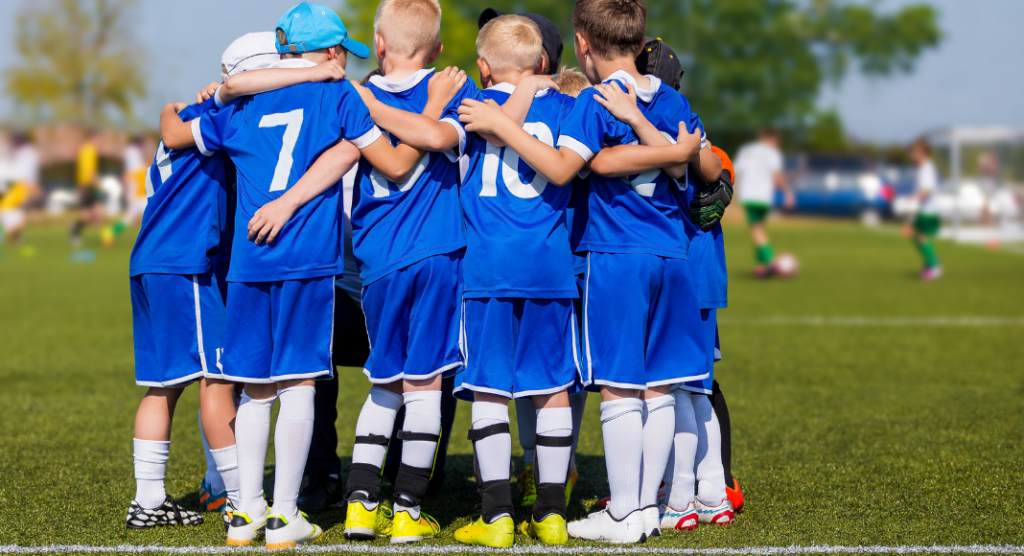The devastating headlines keep coming. Elite collegiate athletes are dying by suicide at alarming rates. Famliy and friends of these athletes site the enormous pressure these young people face to excel at their sport while also striving for excellence in academics and their social lives. Certainly, reform is needed at this level of play, but this pressure doesn’t begin at the college level. What about young kids who participate in competitive athletics? Are we putting too much pressure on them too early? Are we sacrificing our children’s mental health for the sake of sports?
Why Put Kids in Competitive Sports?

Most parents of kids in competitive sports say athletics is an excellent way for kids to exercise, make friends, and have fun. Sports also build character, and they encourage values like teamwork, goal setting, and perseverance.
However, many modern parents and kids feel pressure to choose and excel at a particular sport from a very young age. Instead of playing a different sport each season, many children as young as 7 or 8 join “select” teams that travel and play year round. For many kids in competitive sports, these teams are a healthy outlet. But as parents, we must be diligent in ensuring that the benefits for these young athletes to win, keep improving, and for some, receive college scholarships, are greater than the costs.
Protecting Young Athletes’ Mental Health

How can parents of kids in competitive sports protect their athletes’ mental health? By paying attention, asking the right questions, and being constantly plugged in to the mental state of their young athletes.
Team Culture
No matter how many wins a team racks up or how many of their athletes sign with Divison 1 universities, if the coaches and/or team culture is toxic, it’s not worth it. Before your child joins a team, attend a practice or game. Notice how the coaches relate to the players. Are they encouraging? Do they belittle kids for mistakes? Are they respectful to officials on the field or court? Do the parents support all players on the team? Are they respectful, positive fans? Do the players seem to enjoy each other’s company? Kids in competitive sports spend A LOT of time with their coaches and teammates. It is well worth the time to find the right fit for your family.
Time and Financial Commitment
Parents with kids in competitive sports know that this road is extremely costly, both in time and money. And while this aspect of athletics can be stressful, parents should never let this impact their athlete’s mental health. The costs of sports should never be a burden on a child. This could lead to guilt, anxiety and even more pressure to perform.
Identity
Parents should be aware that when a child becomes good at a sport, it often becomes a huge part of their identity. And while this can be fun for the child and become a point of pride for the parents, there is a downside. When a star athlete gets injured, hits a slump in their sport and isn’t winning, or just reaches the end of their “career”, the loss of that identity can be devastating.
If the identity of your child in competitive sports revolves around their ability to do that sport well, it’s time to reevaluate. Do they also find their identity in being a good friend and family member? Do they have other interests other than their sport? The vast majority of children will not become professional, or even college athletes, and it’s important for them to know that their worthiness extends far beyond the athletic field.
Burnout
Kids in competitive sports who play year round are especially susceptible to burnout. Signs of burnout include mental and physical exhaustion, a negative attitude about playing, and depression and/or anxiety about their sport or other areas of life. Parents should be diligent about monitoring their kids for signs of burnout. Kids, just like adults, need breaks, even from things they greatly enjoy and are good at. It might be worth taking a few weeks or even a whole season off from their sport so your kid can have a break from training and the pressure to perform. You may also consider opting out of select sports and enrolling your child in a rec league where they can just have fun.

There are so many healthy benefits to putting kids in competitive sports, but parents must be aware of the dangers of pressures put on young athletes. We must have appropriate expectations for our children and always be on alert for signs that their mental health is suffering.











